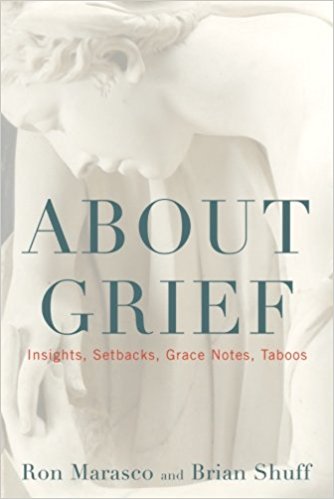Dear Jerry,
Well, hello again. Guess what I found? A letter I had written and somehow missed sending. My goodness, I am dropping the ball here. I promised you, with all good intentions, that I’d share some ideas with you for helping your mom and I start, and then get distracted by my own life. I reread what I wrote and I think it still may be helpful so I’ll just send it along. Please forgive my distractibility!
Here’s what I wrote:
I know I wrote you only a few days ago, but I just bought a book that I think you should pick up. It’s a fairly new one — copyright 2014. The book is About Grief, by Ron Marasco and Brian Shuff. As is typical, I read the beginning and then jumped ahead intrigued by a chapter title. The chapter that made me think of you (and your mom) is Nine Consolations.
I liked the title word, Consolations. As in…something that will console you. Something that will help you feel better. And, as you well know, after you’ve had a family member die, you need all the consoling you can get.
I won’t tell you about all nine of their consolations but I’ll quote a few snippets in hope that you’ll go pick up a copy for your mom. I know she used to like reading — before your dad got sick — and I think if you buy her one grief book, this could be it. If you can’t find a copy before you visit on the weekend, perhaps you can slip some of these ideas into your conversations.
The first consolation is REST. The authors very skillfully write about how simply exhausting grief is. I’d heard (and experienced) how emotion saps your energy but I hadn’t thought about how even “nice” emotion can be tiring.
Here’s a quote,
If the kind of emotion associated with sadness can be a drain, one of the surprising things that grieving people discover is how much of a drain “nice” emotion can also be. People are always doing kind things for someone in grief, and expressing sentiments that are beautiful and meaningful and dear. While this is all very lovely, it can be a massive drain on your emotional resources too.
I’m sure your mom would agree. They also mention how draining it is to have to break the news of someone’s death to one person after another. Telling the story of what happened and how it happened takes a lot of energy. I remember that from when my mom died, having to call and cancel all her different appointments, notify people, and and then to listen to all those condolences.
Of the nine consolations, the one that most surprised me was SPORTS. Sports? I couldn’t imagine someone who is grieving getting right back onto a sports team. But they explain that sports, whether playing or watching, is one activity that gives your head and heart a break from grieving.
I know my mom watched a lot of hockey after my dad died but I didn’t see it as giving her a break from grieving him. I thought she just liked it. Marasco and Shuff suggest that even if the only thing you know about a sport is that your friends like the ones in the red jerseys, you should go to a sporting event with a gathering of people and allow yourself to get swept up in the energy.
What do you think? Do you think your mom would go with you to a hockey game sometime? Your uncle Fred used to be a hockey fan. Maybe he’d go with you. I’m sure he’d be surprised and happy if you’d organize it.
I chuckled a bit when I read that one of their consolations is CYNICISM. They essentially give the grieving person permission to be cynical, sarcastic and a few other choice but not usually socially acceptable variations of angry. I KNOW I’ve had sessions with grieving clients that can only be described as black humour. For example, “What was the dumbest thing someone said to you after your husband died?” And the client has a whole list of “dumb things”.
I liked how the authors said,
….cynicism is a way of releasing rage. It not only feels good to you, it’s also relatively harmless to those around you. Cynicism generalizes rage, refines it into a philosophical stance. Rather than make a direct attack on someone, you can take your rage and point it at an abstract target. Like Christmas.
So I guess if your mom gets snippy and sarcastic you can chalk it up to being a consolation — being cynical helps her feel better.
I won’t go into all the other consolations or this letter will get so long I’m afraid you won’t even read it — but essentially, the authors give grievers permission to feel better, even if that feeling better is just for little bits of time. They encourage people to bring some normalcy back into their lives, to do things they did before they were grieving and not feel guilty.
So, encourage your mom to do things she used to do. If she indicates at all that she feels guilty doing them without your dad, tell her that I give her permission. (I’m just kidding — no one needs to give her permission.) But nudge her a little. Buy some hockey tickets. She will be grieving a long time and it’s just fine to take a break now and then.
Again, take care and say a special hello from me.
Ruth
(and for the rest of you reading this. Here’s a link to About Grief)
Disclaimer: Jerry, and his parents/family are fictional, of course, but I hope by helping them, I can also help you (and your family.)

